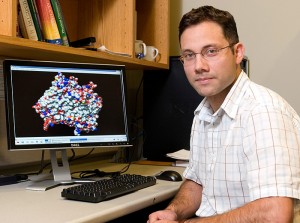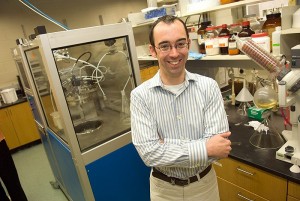
Two assistant professors of chemistry in the College of Liberal Arts and Sciences have won National Science Foundation CAREER awards, which are designed to recognize and promote the work of promising young teacher-scholars.
Nicholas Leadbeater received a $575,000 award for five years for his work in organic chemistry, using microwaves for making chemical reactions cleaner and faster and monitoring the reactions as they run.
José Gascón was awarded $600,000 over five years. He will develop protocols for efficiently and accurately describing the electronic structure of a protein, integrating different levels of theory, including quantum and classical mechanics.
“These prestigious awards showcase the strength of the recruiting efforts in our science programs,” says Jeremy Teitelbaum, dean of the College of Liberal Arts and Sciences (CLAS). “The College has a program in place to mentor our junior faculty so that they apply for and win these awards. I am sure we will see even more of these awards in the future.”
During the past year, four CLAS faculty have won CAREER awards.
Gascón, who joined the faculty three years ago after completing a postdoctoral fellowship at Yale, works at the interface of chemistry, biology, and physics, studying the electronic structure of proteins.
Since a protein is a huge system, and describing its electronic structure involves complex computation. Gascón proposes to develop scalable methods that can translate the quantum nature of a small fragment of the protein to the protein’s full scale.
These methods could be used by scientists studying many types of biological processes. They will enable researchers to learn more about how proteins interact with each other, for instance, or to find better ways to describe interactions between drugs and a particular pharmaceutical target.
For the educational outreach associated with his CAREER grant, Gascón will work with middle school teachers in Windham, helping them learn how to incorporate computational chemistry and modeling into their chemistry curriculum.
“We live in an era in which computation – doing simulations – is increasingly important,” he says. Yet that skill has not yet found its way into middle and high school teaching.
Gascón also will continue chemistry outreach activities through the SECRET (School of Exploratory Chemistry Research Experience and Training) summer program at UConn, now in its third year. He was the coordinator this year. The program introduces exceptional high school students to state-of-the art research carried out by junior faculty in the chemistry department.
The NSF CAREER award is Gascón’s second early career award. When he came to UConn in 2006, he received a $50,000 New Faculty Award from the Camille and Henry Dreyfus Foundation.

Leadbeater, who came to UConn in 2004, is developing ways to scale up microwave chemistry so that larger amounts of materials can be synthesized – kilos or liters, instead of milligrams produced in small microwaves.
He is experimenting with a large scientific microwave – about four feet tall and two feet wide.
Being able to produce larger amounts of material would be useful to pharmaceutical companies that now use small microwaves in drug discovery. Most new drugs being developed fail at the kilo level, so being able to quickly produce that amount would enable chemists to determine whether or not a new drug is feasible, he says.
The educational component of his CAREER grant will be to introduce undergraduate students to the state-of-the-art equipment.
“If we can train students in the use of all this new equipment they can go into the job market and be very marketable,” he says.
He will also be involved with the organic chemistry part of the SECRET program for high school students.
Leadbeater’s research group includes four graduate students and four or five undergraduates.
Other CLAS faculty who have won CAREER awards in the past year are Rajeswari Kasi, assistant professor of chemistry, and Victoria Robinson, assistant professor of molecular and cell biology.


